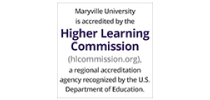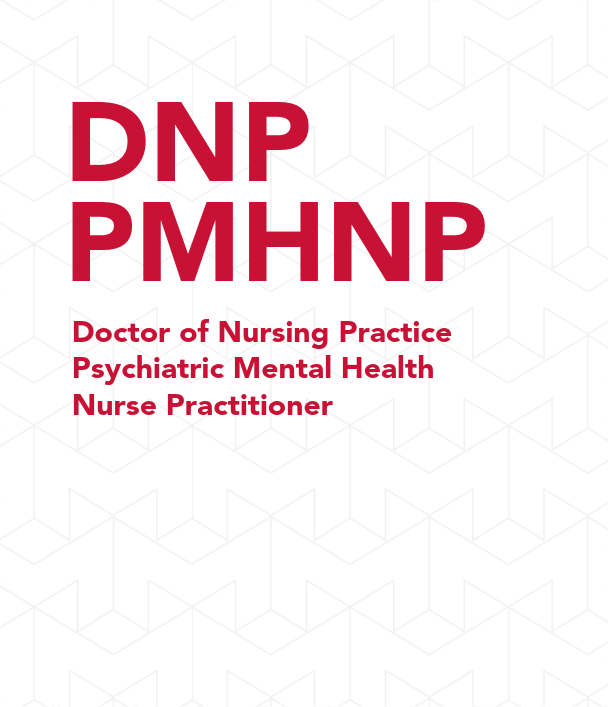Online DNP-PMHNP Program
Overview

Why choose Maryville’s accredited online DNP-PMHNP program?
- Access coursework 100% online with no campus visits required.
- Apply with no GMAT or GRE scores required.
- Earn your DNP-PMHNP in as few as 36 months.
- Complete clinicals locally in your preferred setting.
- Enjoy no waiting list once you’re accepted.

Bravely lead the future of psychiatric mental health nursing practice with your DNP
Are you passionate about improving mental health and supporting patients with behavioral health conditions? Maryville’s online Doctor of Nursing Practice with a Psychiatric Mental Health Nurse Practitioner (PMHNP) concentration prepares experienced nurses to specialize in mental health care while earning a terminal degree.
Our online program helps you develop the advanced skills needed to assess, diagnose, and treat mental health conditions in patients across the lifespan. With our flexible format, you can earn your DNP-NP and prepare for PMHNP certification in around 36 months.

What is the online DNP-PMHNP program?
The DNP-PMHNP is a terminal nursing degree with a focus on psychiatric and mental health care. This program prepares you to work in a range of settings, including outpatient mental health clinics, hospitals, schools, and private practices. In addition to managing mental health conditions, graduates are equipped to take on leadership roles, contribute to improving mental health policy, and advance evidence-based practices in psychiatric care.
For nurses looking to fast-track their DNP, we also offer an online degree without the NP focus. However, this program is not designed to prepare you for PMHNP certification.

Earn your online DNP-NP with Maryville and prepare to go further
- Earn your degree from a program accredited by the Commission on Collegiate Nursing Education (CCNE).
- Take advantage of a flexible 24/7 online learning format that fits your work, life, and family schedule.
- Receive personalized support to help you succeed academically and advance your nursing career.
- Explore clinical inquiry through research courses and an innovative curriculum focused on real-world practices.
- Learn from expert faculty and nursing leaders with deep experience in psychiatric mental health.





Important dates for 2026
Program details

The Maryville online DNP-PMHNP program is designed to:
- Help you build the skills and knowledge to provide mental health care to individuals, families, and communities
- Deepen your knowledge of psychiatric nursing, healthcare systems, administration, management, advocacy, and leadership in behavioral health settings
- Prepare you for PMHNP certification, so you can take on an advanced role in addressing mental health challenges
- Meet the growing demand for mental health care providers in hospitals, clinics, and private practices
- Build your skills in evidence-based practice, therapeutic interventions, and psychiatric care

DNP-NP: A deeper look
Our DNP-NP program enables you to earn your DNP while completing the coursework required for PMHNP certification. This program blends intensive real-world clinical training with a focus on leadership, preparing you to deliver mental health care at the highest level.
Even if you already have an MSN or NP certification, the program offers opportunities to expand your practice into psychiatric care or pursue roles in leadership, research, policy, or education.

Why earn your Doctor of Nursing Practice (DNP) degree with a PMHNP concentration?
With mental health awareness and the need for preventive care on the rise, now is the time to advance your career as a psychiatric mental health nurse practitioner. This program can help you make a meaningful difference in mental health care while expanding your career opportunities.
Learn how our online DNP-NP program can help you lead the way in psychiatric nursing.

DNP-NP vs. PhD in Nursing
While a PhD prepares professionals for academic and research careers, a DNP or DNP-NP is focused on clinical leadership and improving patient outcomes. The DNP-PMHNP track equips you to specialize in mental health care, offering advanced treatment and support for patients across the lifespan. Additionally, it qualifies you for leadership roles in healthcare systems, administration, and policy.
If your passion lies in advancing mental health care as a psychiatric nurse practitioner, the DNP-PMHNP is the ideal route for you.

The field needs you now
As the demand for mental health services continues to grow nationwide, psychiatric mental health NPs are playing a vital role in addressing the mental health crisis. Contributing factors include a heightened awareness of mental health issues, limited access to care, and an increased need for holistic, patient-centered approaches.
With shortages not only in nursing and primary care but also across mental health-related disciplines, PMHNPs stand to play a critical part in addressing the mental health of patients. Skilled, compassionate leaders like you can make a difference.

Dedicated student support from application through graduation
At Maryville, we’re committed to helping you succeed. Through our online DNP-PMHNP program, you’ll receive tailored guidance and access to valuable resources from your first application to graduation. We’ll help you develop the tools you need to thrive in your education and career, empowering you to make a lasting impact in the mental health field.
- Personalized student support advising
- 24/7 technical help desk
- Online study and tutoring services
- Access to the library and other learning tools
Learn more about our dedicated student support coaches here.

What other DNP-NP specializations are available?
Want to explore NP roles outside of psychiatric mental health? We offer four other NP concentrations, so you can expand your DNP credentials and pursue your goals in nursing. Choose from the following:
Careers

What can you do with your online DNP-PMHNP degree?
As a psychiatric mental health nurse practitioner, you have the ability to provide critical care to individuals experiencing or living with mental health challenges. With your online DNP-NP from Maryville, you can pursue leadership roles that allow you to enhance mental health services and close healthcare gaps in your community.
As a terminal degree in nursing, the DNP can also prepare you to make a career transition into roles in areas like policy, education, or administration. Earning your DNP-PMHNP can help you achieve your goals while making a meaningful impact.

Career prospect trends for DNP-educated nurses and NPs
- The U.S. Bureau of Labor Statistics projects a 35% growth in advanced nursing roles, including PMHNPs, between 2024 and 2034.
- The increasing prevalence of mental health disorders and the shortage of psychiatric professionals across disciplines point to the critical need for skilled PMHNPs, as reported by the National Institute of Mental Health.
- Psychiatric nurse practitioner ranks among the highest-earning roles in nursing, according to career resource Indeed.
- While an MSN is currently the standard requirement for becoming an NP, organizations like the AACN and NONPF are pushing for the DNP to become the new standard in advanced nursing education.

DNP-educated nursing professionals are industry difference-makers
With a DNP, you’ll be equipped to pursue leadership roles in clinical, administrative, policy, and community settings, just to name a few. With an ongoing shortage of professionals across both primary care and mental health disciplines, and with a trend toward higher autonomy and more responsibility for NPs, your DNP-PMHNP can position you to make a major difference for people of all demographics and backgrounds.
Additionally, DNP-trained professionals can help address the faculty shortage in nursing education. The AACN reports that tens of thousands of qualified students are turned away from nursing programs due to a lack of instructors. With a DNP, you can help train aspiring psychiatric NPs and influence the future of mental health care.

What can online DNP or DNP-NP graduates do?
A DNP is one of the highest degrees a nurse can achieve, offering opportunities that go far beyond greater independence, specialized expertise, or higher pay. Nurses with DNPs leverage their advanced training to make a meaningful impact in the field. Here are a few ways DNP-NP graduates effect change.
- Lead and manage clinical research initiatives.
- Support and champion changes in healthcare policy through legislation.
- Advocate for practices that prioritize patient safety and rights.
- Lead collaborative projects to shape the future of nursing.
- Take on key leadership roles in executive positions or government offices.
- Open an autonomous practice (24 states now permit those with a DNP to open their own clinics).
As a psychiatric mental health NP with a DNP, you can also pursue higher-level practice and leadership roles in patient care in your concentration area.

What careers can I pursue with my online DNP-NP?
Your DNP can help you achieve certification and become an NP, unlocking many career paths. You could specialize in nursing administration, policy, education, clinical training, executive leadership, or nursing informatics. But your DNP can help you qualify for even more diverse roles within the nursing field, including:
- Chief nurse anesthetist
- Chief nursing officer
- Director of nursing services
- Health policy analyst
- Hospital CEO
- Medical and health services manager
- Nursing manager or supervisor
- Nurse midwife
- Nursing professor
Find out more about DNP and DNP-NP careers here.

Where do DNP-educated PMHNPs find career opportunities?
Earning your DNP with a PMHNP concentration opens the door to a variety of career opportunities in settings within the healthcare and mental health fields, including the following.
- Behavioral health clinics
- Hospitals and clinics
- In-home care
- Long-term care facilities
- Psychiatric mental health facilities
- Nursing research facilities
- Rehabilitation facilities
- Retirement homes
- Schools, colleges, and universities

What is the typical salary for online DNP program graduates?
Data from PayScale in 2025 reveals that DNP holders earn an average salary of $115,000, based on self-reported figures across career fields. Jobs involving or encouraging a DNP degree are often lucrative and satisfying.
Clinical positions like nurse practitioners usually command higher pay than administrative or nonclinical roles. For instance, the U.S. Bureau of Labor Statistics listed a median salary of $129,000 for nurse practitioners in 2024. According to Indeed, psychiatric mental health nurse practitioners are among the 11 highest-paid nursing roles.

What is the pay for DNP-educated psychiatric mental health nurse practitioners?
With high demand and a wide range of practice options, psychiatric mental health nurse practitioners tend to rank among the highest-paid NPs. The median salary for nurses with PMHNP qualifications is approximately $123,000, based on PayScale data from 2025. However, salaries can vary widely, with the top 10% reporting salaries higher than $156,000.
Earning a DNP can open doors to higher-level, better-compensated positions in advanced care or nonclinical nursing areas, such as:
- Chief nursing officer (CNO): $148,000*
- Clinical nurse specialist: $104,000*
- Director of nursing services: $102,000*
- Nurse manager: $98,000*
* Average salary information based on data compiled by PayScale as of 2025
Earn an education with a strong ROI
We’re proud to be recognized among the leaders in social mobility in our region*:
- No. 1 in social mobility among private colleges and universities in the St. Louis area
- No. 1 in lowest average debt among regional private peers
- Top 3 in St. Louis for graduation rates and early-career earnings
These rankings serve as indicators of strong ROI for our graduates — meaning your Maryville education can help you start faster and go further.
Flexibility and support to graduate with confidence
Juggling a nursing career while pursuing your DNP is a challenge, but we've got your back. Our program provides unparalleled support, resources, and online flexibility to help you manage your commitments.
2025 graduate Sarah Barney discovered she could successfully earn her DNP by fitting our flexible coursework and intuitive platform around her demanding schedule. Hear about her experience.
Testimonials
“The way that the curriculum is set up at Maryville, each semester built upon the previous one, so we’re learning as we go. It’s not an overwhelming process. A lot of times, that’s much like our careers are in the healthcare field. We all have something new to learn, every single day.”
— Tiffany N., graduate, Doctor of Nursing Practice
“With the DNP, it allows me to become a faculty member, or it allows me to become more understanding of research … in a clinical setting, which is huge. It gave me the self-confidence I have been looking for my whole adult life.”
— Megan J., graduate, Doctor of Nursing Practice
Curriculum
What is the curriculum for the online DNP-NP programs?
Prepare for a fulfilling and impactful psychiatric mental health nursing career with an education that meets today’s challenges. Our online Doctor of Nursing Practice program is designed with your future in mind.
The DNP-NP program can equip you with advanced skills and knowledge for high-level nursing roles while preparing you for NP certification. The Psychiatric Mental Health Nurse Practitioner concentration focuses on providing mental health care across the lifespan. You’ll gain doctorate-level expertise in diagnosing, treating, and managing mental health conditions through a holistic approach. The curriculum covers upper-echelon nursing skills, NP core competencies, and PMHNP-specific training and clinical practice.
Begin in spring, summer, or fall, with all courses delivered 100% online.
Doctor of Nursing Practice (DNP) core and capstone courses
Doctor of Nursing Practice foundation courses (15 credit hours)
This course is designed to introduce students to the purpose, content, and methods of epidemiology and biostatistics. Students will learn to evaluate and use output from statistical computing software.
Prerequisite: NURS 710
This course is designed to explore the phenomenon of interest related to the DNP scholarly project. Students will systematically develop a project protocol that is supported by the literature and submit it for department approval.
Course objectives:
- Develop a clinical question that guides the scholarly project.
- Read critically from professional nursing literature and other related disciplines to interpret, analyze and apply current research to improve practice.
- Apply a systematic approach to address clinical problems within healthcare organizations, including outcome measures and a sustainability plan to create meaningful changes in clinical outcomes.
- Develop a protocol and submit it to the DNP council for project approval.
- Develop the first chapter of the scholarly project that includes needed sections based on the selected DNP project format.
This course is designed to emphasize an objective approach to the integration and synthesis of knowledge. Manuscript preparation and practical use of evidence are incorporated to prepare students for the design of research proposals.
Prerequisite: NURS 700 and NURS 701
This course is designed to provide an understanding of the measurement of phenomena as it relates to the research process. Procedures for selecting, applying, and interpreting the correct statistical application to a research problem will be presented with students processing the results.
Prerequisite: NURS 700
Doctor of Nursing Practice capstone courses (18 credit hours)
This course will allow the students to design an evidence-based project that will guide clinical practice. The feasibility of conducting this initiative will be explored. Potential funding sources and budget issues will be examined. Students will apply the elements of protection of human subjects and complete the Maryville IRB.
Prerequisite: NURS 700, NURS 701, NURS 702, and NURS 703
This course is designed to expand the students knowledge of clinical project data collection and analysis of data. Students will apply integrated research concepts pertaining to the clinical project. Utilization of various methods of data analysis and data management systems will be explored. Complete project data is needed prior to the start of this course.
Prerequisite: NURS 705 and NUS 705L
This course is designed to expand the students understanding of methods of dissemination in translational research. Variables that impact the analysis of data related to the scholarly project will be examined. Implications for patients, clinical practice and the healthcare systems will be explored and findings disseminated.
Prerequisite:NURS 706
DNP-NP PMHNP concentration
Graduate nursing core courses (6 credit hours)
Nurse practitioner core courses (11 credit hours)
This course explores focused and comprehensive health assessments in a variety of settings and patients across the lifespan. This includes development of health promotion strategies and prioritization of care.
Prerequisite: Online - NURS 611, NURS 615
Corequisite: On Ground - NURS 615
This course focuses on the pharmacological foundation for safely prescribing medical regimens of illnesses for individuals across the lifespan. Also included are illness prevention, non-pharmacological and legal implications for prescriptive authority for the nurse practitioner.
Note: Selection of appropriate therapies, patient education and evaluation parameters are stressed.
PMHNP concentration curriculum (21 credit hours)
This course will cover assessment and identification of discrete aspects of cognition, psychopathology, affect and behavior in the diagnosis and treatment planning of psychiatric illness across the life span. Also included is the appropriate use, monitoring and evaluation of prescribing psychotropic medication, including pharmacokinetics and pharmacodynamics.
Prerequisite: NURS 611, NURS 612 and NURS 615
In this course theories and models will be used to develop an understanding of the etiologies of acute and chronic mental health disorders among adults and older adults. Selection of appropriate treatment strategies including individual and group psychotherapies will be discussed.
Prerequisite:NURS 660
Corequisite:NURS 662 or NURS 662C
This practicum course is designed to synthesize advanced practice knowledge relevant to adult and older adult patients with psychiatric illness. A variety of psychotherapeutic strategies will be explored.
Prerequisite:NURS 660
Corequisite:NURS 661
This is the first of two didactic courses designed to assist the student in development of the advanced practice nursing role with the care and management of individuals with a mental health disorder across the lifespan.
Prerequisite:NURS 661 and NURS 662 or NURS 662C
Corequisite:NURS 664 or NURS 664C
This practicum is designed to synthesize advanced practice knowledge relevant to patients with psychiatric illness across the lifespan.
Prerequisite:NURS 661 and NURS 662
Corequisite:NURS 663
This is the second of two didactic courses designed to assist the student in development of the advanced practice nursing role with the care and management of individuals with a mental health disorder across the lifespan.
Prerequisite: NURS 663 and NURS 664 or NURS 664C
Corequisite: NURS 667 or NURS 667C
This practicum is designed to synthesize advanced practice knowledge relevant to patients with psychiatric illness across the lifespan.
Prerequisite: NURS 663 and NURS 664
Corequisite:NURS 665
Admission requirements

- MSN degree from a regionally accredited institution and CCNE/ACEN/CNEA accredited nursing program
- Cumulative GPA of 3.25 on a 4.0 scale in all college work
- At least one year of professional nursing experience
- Current, unencumbered licensure as an RN in the U.S.
- Official transcripts from every post-secondary school where you earned a degree or completed any graduate-level coursework
- Transfer credit request form

Applicants who do not meet the minimum GPA requirement will be required to submit a personal statement explaining the low grades and outlining plans for improvement.
The acceptance of transfer credit is at the discretion of Maryville University. View our transfer credit policy here.
Maryville’s online nursing programs require students with an international education background to have their BSN from a CCNE/ACEN accredited program for the MSN and BSN-DNP programs, and their MSN from a CCNE/ACEN accredited program for the Post-Master's Certificate, DNP, and DNP-NP programs. Please reach out to an enrollment advisor for more information.
Interested in this degree?

University details
Founded in 1872 — top-rated today
Maryville University is proud to be recognized as one of America’s best colleges by U.S. News & World Report and Forbes.
At Maryville, we invite future nursing leaders to be brave and expand their potential. Let’s be brave together.
Online DNP degrees: Meet our faculty
Mariea Snell, DNP, APRN, FNP-C
Associate Professor of Nursing and Director of DNP Programs
“At Maryville University, we are educating the future of nursing. Our graduates are tasked with serving patients with compassion, competency-based healthcare, and advocacy. Our faculty strives to ensure students are challenged to rise to the top, think critically, and be leaders in the profession. We hope to support our students in the fulfillment of their educational pursuits.”


Why should students choose to enroll in the DNP program at Maryville?
Maryville University has created a unique program that supports the work of emerging leaders in healthcare. We see each student as an individual with a unique background and area of interest. Faculty members support these interests and help them develop their body of clinical work.

How can nurses address issues of access to healthcare in rural communities?
Technology is solving many issues in healthcare. Telehealth has shown to be an effective way to meet patients in communities that lack access to care. Nursing plays a very important role in the delivery of care in this way. As telehealth evolves over time, nursing will be a key player in its development and implementation.

What are the most important skills employers are looking for?
Employers are looking for the DNP graduate to be a systems-level thinker who can create change in healthcare systems. They need people who can see not just the patient-and-disease process but also how the system works together to improve the health of communities.

What advice would you give to someone studying nursing?
Nursing education is challenging and rewarding. I would tell any nursing student to focus on the reason they decided to go into this profession. Keep that motivation to help patients and communities going forward. Give yourself the time and space to truly absorb and learn the material. Keep in mind that education is your foundation and much more learning will happen as you begin to practice.
Frequently asked questions
Graduates of Maryville’s online Doctor of Nursing Practice program are prepared to lead in clinical and nonclinical roles across healthcare. This program includes psychiatric mental health NP coursework, equipping you to address a critical healthcare need and provide advanced mental health services to individuals, families, and communities.
Whether your goal is to work in private practice, inpatient psychiatry, or community mental health settings, the PMHNP focus helps prepare you to address complex mental health needs and advocate for better access to mental health services.
Psychiatric mental health nurse practitioners (PMHNPs) are among the highest-earning NPs, thanks to high demand and diverse practice opportunities. According to PayScale data from 2025, the median salary for PMHNPs is around $123,000. However, earnings can vary significantly, with the top 10% reporting salaries of at least $156,000.
Salaries vary based on factors like discipline, education level, years of experience, and location of practice.
Accredited by the Commission on Collegiate Nursing Education (CCNE), Maryville’s online DNP programs follow strict guidelines to ensure top-tier nursing education. This reflects our program’s dedication to maintaining high educational standards.
Maryville University is also regionally accredited by the Higher Learning Commission (HLC) and has proudly upheld this accreditation since 1941.
As the nursing profession expands with greater responsibilities, advanced education has become essential. The Doctor of Nursing Practice (DNP) is one of the highest degrees in nursing, offering specialized training and equipping nurses for leadership roles and advanced practice.
For DNP-educated psychiatric mental health nurse practitioners (PMHNPs), the opportunities are significant. These highly trained professionals provide critical mental health care to individuals facing psychiatric challenges, helping to address the growing shortage of mental health providers. With prescriptive authority in all states, DNP-prepared PMHNPs can manage comprehensive treatment plans, including psychopharmacologic regimens, and make a meaningful impact on patient outcomes.
Earning a DNP not only enhances clinical expertise but also opens doors to leadership roles, policy development, education, and research.
Graduates of our Psychiatric Mental Health DNP program are well-prepared to obtain certifications such as the Psychiatric-Mental Health NP Certification (PMHNP-BC™) from the American Nurses Credentialing Center (ANCC) and the Psychiatric Mental Health Nurse Practitioner (PMHNP) certification from the American Academy of Nurse Practitioners (AANP).
Maryville’s NP graduates consistently surpass national pass rate averages for certification exams across various specialties.
If you're not looking to pursue NP certification, you can opt for the standalone DNP instead, enabling you to graduate sooner and prepare for advanced roles within or related to nursing.
Choosing between a DNP and an MSN depends on where you see your nursing career headed. A DNP is a terminal degree tailored for those interested in leadership, research, and advanced clinical roles, ideal for nurses seeking to elevate care and lead initiatives.
An MSN is often a better fit for RNs aspiring to become NPs or for NPs specializing further. While both degrees provide essential nursing education, a DNP offers more advanced knowledge and career flexibility.
You don’t need an MSN to pursue a DNP. For BSN-prepared nurses, we offer a BSN to DNP pathway, allowing you to move straight into a DNP program on an accelerated timeline.
If you’re interested in exploring options other than your DNP-PMHNP, we offer four additional NP concentrations to help you reach your goals:
You can also choose to earn your DNP without an NP concentration to complete your terminal degree faster. However, this option does not prepare you for NP certification.
Online Doctor of Nursing Practice careers


